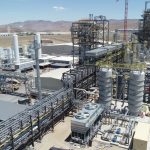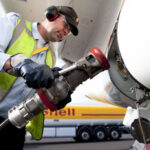With UK elections due to take place this year, industry coalition Sustainable Aviation has launched a manifesto that calls on the next government to accelerate policy action on the transition to net zero aviation. Specifically, it sets out how the incoming government can ensure the UK is world-leading in sustainable aviation through becoming an early mover on SAF production and supply, strengthening aerospace technology innovation and accelerating airspace modernisation. The industry group represents airlines, airports, manufacturers, air navigation service providers and fuel producers. The government has just announced £200 million ($250m) in joint public/industry investment for energy efficient aircraft while the UK CAA has selected three companies for the government funded Hydrogen Challenge Sandbox. Elsewhere, SAF startup Avioxx has raised new investment towards developing a UK SAF production plant.
Top of the industry’s wish list for the new government is action to deliver commercial UK SAF production at scale this decade with at least five UK SAF plants under construction in 2025. Sustainable Aviation’s roadmap for the UK aviation sector to reach net zero by 2050 shows that of all the mitigation measures available, SAF will have by far the largest influence on achieving the goal, accounting for 39% of 2050 total unabated emissions.
The cross-sector group calls for an accelerated timetable to deliver a government-backed SAF revenue support mechanism through the introduction of primary legislation in the early months of the new parliament. This would be a catalyst to establish a pipeline of investment for SAF production of second-generation advanced SAF ahead of power-to-liquid SAF in the medium to long term, it says. To ensure aviation has a fair share of sustainable feedstocks for second-generation SAF, regulations should be amended to ensure SAF is prioritised as an energy recovery pathway for waste, it recommends.
The industry manifesto also calls for government support for long-term R&D on aerospace innovation to provide the UK with a competitive advantage in aviation efficiency and the commercialisation of new technologies, including hydrogen. In order to meet the net zero by 2050 objective, capacity should be secured to meet the required renewable energy to produce renewable fuels for the industry. The roll-out of carbon removal and carbon capture and storage technology should also be accelerated to mitigate residual aviation carbon emissions by including carbon removals in the UK ETS scheme “and ensuring aviation’s fair share”.
Commented Matt Gorman, Chair of Sustainable Aviation and Heathrow Airport’s Sustainability Director: “Our transition to net zero flight will not only safeguard and grow aviation’s contribution to the UK economy but also create thousands of new jobs. By leveraging our existing strengths as an aviation nation, we can lead the world in green aviation technology.”
The manifesto was launched at an event in Parliament attended by Aviation Minister Anthony Browne and the opposition Labour Party’s Shadow Minister for Industry and Decarbonisation, Sarah Jones.
The final details of the UK SAF mandate legislation, due to be in force during 2025, are expected to be published by the government very soon.
This month, the UK government announced almost £200 million of joint government and industry funding for aerospace R&D projects to support the development of energy efficient and zero-carbon aircraft technology towards the transition to net zero. This includes £40 million for a project by Marshall Group to develop zero-carbon engine technology and £96 million investment in Airbus-led projects developing more efficient wing designs.
Funding for these projects will be delivered through the Aerospace Technology Institute (ATI). It was also confirmed that the £975 million in aerospace funding over the five years from 2025, announced late last year, will be allocated to the ATI programme. The programme has facilitated over £3.6 billion of joint government and industry R&D investment to date.
Meanwhile, the UK Civil Aviation Authority has selected Cranfield Aerospace Solutions, Exeter Airport Consortium and ZeroAvia for its Hydrogen Challenge Sandbox, an initiative to increase industry and regulatory readiness for the introduction of hydrogen fuel and new technologies. The challenge was launched in November with grant-based funding of £940,000 from the Regulators’ Pioneer Fund, which is overseen by the UK’s Department for Science, Innovation and Technology, and runs for an initial period until February 2025.
Cranfield Aerospace Solutions is developing a hydrogen fuel cell drivetrain to be applied to aircraft and aims to conduct ground testing and flight trials this year. The CAA will work with the company on identifying hazards, risks and safety challenges associated with its project.
ZeroAvia, which is also developing hydrogen-electric engines and already flying a prototype system in a Dornier 228 testbed under a UK CAA Permit to Fly, will work with the regulator to identify hazards, risks and safety challenges associated with the retrofitting of a hydrogen-electric powertrain.
A study by Regional & City Airports, TUI, hydrogen technology developer ULEMCo and Cranfield University is looking at reducing the environmental impact of aircraft turnarounds at Exeter Airport. Through the challenge, Consortium members and the regulatory authority will review and provide feedback on safety cases, test plans and risk assessments, and ultimately inform the development of guidance material and regulations for the future.
“Working with the three selected companies will enable us to take a step closer towards a net zero aviation sector by supporting the industry to explore how feasible the introduction of hydrogen is and how we can make sure regulation develops with the technology and is fit for purpose,” said Tim Johnson, Director of Strategy and Policy at the UK CAA.
In other UK news, SAF developer startup Avioxx has successfully closed a pre-series A funding round led by UK travel company Trailfinders. The undisclosed capital investment, said Avioxx, will bolster its R&D efforts and expand market reach, design and regulatory approval of a first 5,000 tonne per year SAF production plant. The company aims to deliver a full-scale 32,000 tonne-per-year plant by 2027. Its patented system, which transforms waste destined for incineration or landfill, aims to deliver SAF at price parity with fossil-based jet fuel through the incorporation of solid oxide fuel cells to the manufacturing process.
“We’ve rapidly prepared Avioxx for a pre-series A round and our partnership with Trailfinders is ideal to support the delivery of our vision,” commented CEO Chris Hancock. “Trailfinders can offer much more than capital with access to their established networks within the travel community and experience. We’re thrilled to accelerate the development of the business and delivery of our initial operational SAF plant is now much closer.”
Further rounds of funding will be announced later in the year for the development and construction phase of the initial plant planned for the northwest of the UK.
Photo: Heathrow Airport














More News & Features
Early data shows uncertainty that UK SAF mandate can be met in its first year
UK government starts new consultation on SAF revenue certainty mechanism
Catagen launches SAF production company and signs offtakes with Ryanair and Shell
NATS survey shows a continuing disconnect of public attitudes to the environmental impact of flying
UK government announces grant funding awards totalling £63m to 17 SAF projects
ZeroAvia intensifies UK activity, as it progresses certification of zero emission powertrains